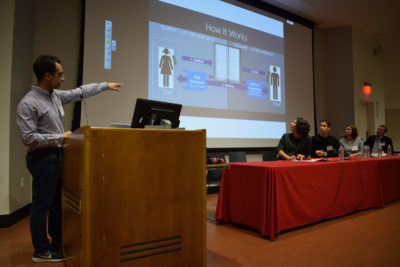
The Pardee School Initiative on Forced Migration and Human Trafficking (FMHT) hosted a workshop about the roles of technology, public policy and law as it relates to human trafficking on Oct. 27-28 as part of their Jean Monnet Migration Innovation Series.
The workshop, “Disrupting the Human Trafficking — Migration Nexus,” spanned two days and the first day featured panels about the interdisciplinary elements of the workshop. The second day consisted of workshops on public opinion, policy innovations, legal challenges and areas for future research, according to Claire Coffey, manager of the Jean Monnet Grant Project.
Coffey, a graduate of the Frederick S. Pardee School of Global Studies, wrote in an email that the Jean Monnet Migration Innovation Series, which was funded by a grant from the European Union, “is dedicated to addressing the issues of forced migration and human trafficking from a variety of multi-sector perspectives.”
Many policymakers are not aware of tools that can inform vulnerable populations and help victims, she added, so the series is intended to raise awareness of them.
One panel in the workshop discussed proposed interventions to the global human trafficking and migration crises, featuring perspectives from representatives from the European Union, the medical community, the private sector and humanitarian organizations.
Madalina Rogoz, a research officer at the International Centre for Migration Policy Development in Vienna, Austria, presented a study on how consumption of goods and services affects the context of human trafficking.
“We looked at the demand in the context of trafficking human beings, what this demand means and what kind of measures states can implement to reduce this demand,” Rogoz said.
She said she thought the workshop was an efficient way for policy development groups to exchange and discuss solutions against human trafficking.
While some of the event’s speakers were specialists in human trafficking policy development, others, like sociologist and UNICEF researcher Olivier Peyroux, take care of accompanying minor migrants, mostly from the Middle East, to safety.
Peyroux said he hoped the various perspectives presented at the workshop would provide a platform to discuss human trafficking and migration on a global scale.
“It’s important to understand what the perspectives are here also and how we can transform it into a kind of global issue,” Peyroux said.
Another panel that covered legal challenges in solving the human trafficking and migration crises began with a speech from Jan Van Dijk, vice president of the Group of Experts on Action against Trafficking in Human Beings (GRETA) of the Council of Europe. During his presentation, Van Dijk showed the attendees photos of 300 migrants packed into the migrant reception center in Europe in 2017 to highlight the poor conditions migrants are subject to.
And another panel included a discussion of mobile applications that can be used to assist victims of the human trafficking crises, which are currently being developed by Boston University students and professors.
“BU students have been working to develop several apps which can help unaccompanied children in France and offer medical support information for people living in Jordanian refugee camps,” Coffey wrote in an email. “Other presenters have worked on developing apps in Nepal, and the Libertas Project, which offers users access to human rights lawyers and information.”
Many attendees said they appreciated the workshop’s efforts raising awareness of human trafficking
Carleen Wenner, a junior in Pardee who is taking a class on forced migration and human trafficking, said her class is working on developing an app with the Libertas Project to remedy human trafficking.
“[The app] would be for someone who’s being trafficked, whether they know they’re in this situation or not, can at least keep a record of their personal information on the app, take pictures of their living conditions,” Wenner said. “We also discussed having … a web portal that local NGOs can use to keep track of things. The class is still deciding what we’re going to pursue.”
Wenner said she thought the workshop was important for its ability to “get many people together to discuss initiatives and what they’ve been working on and technology and other platforms.”
Avik Jain, a 22-year-old master’s student studying Latin American Studies, said he attended the event to learn more about the policies related to the migration crises in various parts of the world and with the hopes of destigmatizing the issue.
“With human trafficking … you’re not necessarily seeing the huge violence but it is an internalized kind of suffering. It is important to hear [the speakers] get their ideas out there and talk about it like a normal issue, just like we talk about education and healthcare,” Jain said.

















































































































